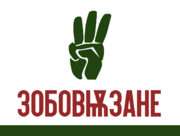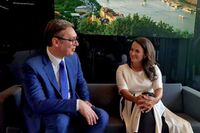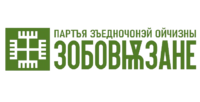Zobowiazanie
Zobowiazanie | |
|---|---|
 | |
| Abbreviation | PZOZ |
| Leader | Elena Jachowski |
| Deputy Leader | Eugeniusz Kusy |
| President | Jakub Lewkowicz |
| Founder | Kazimierz Glogowski |
| Founded | 1 April 1989 |
| Headquarters | Krada |
| Youth wing | H89 |
| Armed Wing | Miersan Honour |
| Membership | 620,000 |
| Ideology | Miersan nationalism National conservatism Social conservatism Pro-Soravianism |
| Political position | Right-wing to far-right |
| Colors | Green |
| Sejm | 248 / 306
|
| Party flag | |
 | |
The United Fatherland Party "Zobowiazanie" (Miersan: Партъя зъедночонэй ойчизны «Зобовѭзане»; Partia Zjednoczonej Ojczyzny "Zobowiązanie"), or simply Zobowiazanie (tr. "Commitment"), abbreviated PZOZ, is a right-wing political party in West Miersa. it has been the sole ruling political party in the country since it's foundation by President Kazimierz Glogowski in 1989. It is currently led by President Jakub Lewkowicz and Premier Elena Jachowski.
It was founded by Glogowski in 1989 with the intentions of changing his policies and solidifying his rule in the country. His isolationist and ethnic nationalist policies of the 1980s had become unpopular, Glogowski decided to reform his political platform with the creation of the party.
Over time the party solidified it's hold on West Miersa, Glogowski would be succeeded by Tomasz Kopernik, who would begin to further reopen West Miersa to the world but also began to suppress opposition. Kopernik would be succeeded by Jakub Lewkowicz, he would further suppress opposition parties during his rule and begun to move close towards Soravia.
It has been the dominant political party in West Miersa since it's creation in 1989, replacing Republika as the dominant party in the country. It has much influence over the media and military, and has numerous systemic advantages such as funding. It's also possesses control over far-right paramilitaries such as Miersan Honour and partially the Hussars 89 movement. These groups have been accused of using political violence to silence opposition. Members of the party are nicknamed "Zobowy" (lit. "Zobowies") by opposition and party members.
History
Foundation and Glogowski leadership
After the Miersan War, West Miersa had been struck economically and mentally. The country would then fall into another war, the Lemovician War, in 1982, with the region eventually being annexed by Champania in 198X. Kazimierz Glogowski was made President of West Miersa in 1982 with promises and reforms and reconstruction. The Lemovician War had hurt his reputation early and the defeat by Champanian forces also hurt the public's trust in him. His policy of isolationism and anti-Soravianism had become unpopular by the late 1980s.
By 1989 the people had become dissatisfied with much of Glogowski's policies, but he was able to win reelection just barely in 1987. His policies in 1988 had become less nationalistic and more economy focused.
In 1989 he would found Zobowiazanie (tr. Commitment), a right-wing nationalist political party that would transform the political scene in West Miersa. The party's platform was much different than Glogowski's earlier isolationist and ethnic nationalist policies as an independent. Many of this old allies were eventually thrown out of their offices or arrested by the government. He would surround himself with Soraviophiles and many former Republika party members. This shift in stance became known as "Glogowski's Roller-Coaster".
During Glogowski's leadership the party would dominate the country's politics, taking over the role the Republika party had left off with. Glogowski would open the country to Soravia in the 1990s and joined Samorspi. The 1990s and early 2000s saw economic progress beginning to take shape. The party would adopt the "three fingers up" symbol, which is supposed to represent Saint Michael, the patron saint of Miersa.
Kopernik leadership
Tomasz Kopernik would take over in 2004, he would begin a policy of suppressing opposition parties. He would ban smaller left-wing parties from running in certain elections in certain hotly-contested regions. In 2005 economic recession would hit West Miersa and the leadership of Zobowiazanie would take control of many sectors of the economy to prevent collapse. This policy would never be undone, as many sectors of the West Miersan economy continue to be controlled by the government.
In 2006 an uprising by Savader and Lemovician rebels would rise up, the government of Kopernik would recruit paramilitaries and militias. The government of Kopernik would greatly revamp and upscale the party's armed winged, Miersan Honour. They would be used to crush dissent and indimidate. In 2014 he would resign from his role of party leader and was succeeded by Jakub Lewkowicz.
Lewkowicz and Jachowski leadership
In response to the election of Lewkowicz, protests erupted across West Miersa, known as the Gwiazdzy Protests, during this time paramilitary and militia forces were deployed, including Zabowiazanie's Miersan Honour forces. Another uprising by Savader and Lemovician groups would occur during his tenure, this was also crushed by the government forces.
Lewkowicz would attempt to reopen relations with East Euclean countries such as Werania and Estmere, but to little avail. During his rule economic output and success in West Miersa would go up, and his rule became more popular over time.
In 2022 Lewkowicz would resign from his role as party leader and instead continue to rule the country as President. He would appoint Elena Jachowski to the position of party leader. She would attempt to modernise and digitalise the party. Today Zobowiazanie is considered a authoritarian party that uses any means to continue to rule.
Organisation
Leadership
| No. | Name (Born–Died) |
Portrait | Term in Office | |
|---|---|---|---|---|
| 1 | Kazimierz Glogowski (1931-2006) |
 |
1989 | 2004 |
| 2 | Tomasz Kopernik (1964-) |
 |
2004 | 2014 |
| 3 | Jakub Lewkowicz (1970-) |
 |
2014 | 2022 |
| 4 | Elena Jachowski (1976-) |
 |
2022 | Present |
H89
Hussars 89, or H89, is the youth wing of Zobowiazanie, founded in 1989 by Glogowski, it is made to reach out to young West Miersans and give them skills in political activism and everyday life. But they are also used in similar fashion to paramilitary and imtimidation groups. Their members range from as young as 8 years old to 21 years old.
They are one of the largets mass youth wings in the Euclean continent, with over 200,000 active members. In some fashions, they are used to protest in support of the government and use intimidation tactics against opposition. They are also used to train for future participation in the paramilitary Miersan Honour or the Miersan military. They also run party events, food pantries, and other civilian activities.
Miersan Honour
Miersan Honour is the paramilitary wing of the party. One of the many numerous paramilitary and militia organisations in West Miersa. It is one of the largest paramilitary groups in Euclea. It has over 30,000 active members. They are trained in protest tactics, anti-opposition intimidation and violence, and military combat.
During times of riots and violence they have been deployed alongside police to help take down protests. They have also been deployed in fighting rebel groups in West Miersa such as the Savader People's Army. In East Miersa and MASSOR nations they are a registered terrorist group, and have been accused of being apart of state backed terrorism against opposition in West Miersa.
Ideology
The party is mostly based around the ideology and political views of it's founder, Kazimierz Glogowski. Glogowski's ideology before the foundation of the party was different than the party's platform. Before the founding of the party in 1989 Glogowski was an isolationist and ethnic nationalist, banning the languages of Soravian and Savader, and isolating the country from everyone. The country during the mid 80s was marked by ethnic violence and near civil war.
After the foundation of the party however, Glogowski's views had changed. He became more open to other nations, especially Samorspi nations like Tengaria or Soravia. He would unban Soravian and Savader in 1989 and changed his views drastically. In Foreign policy the party today is still Miersan nationalist, and is adversarial to the East, claiming that East Miersa are merely "voivodeships under Valduvian occupation". The party is very open to support from Soravia today and the country today is considered by some to be a puppet state of Soravia. The party has tried to open up to EC nations to little avail.
In domestic policy the party is socially conservative, with the party having banned things such as LGBT events and socialist events. The party has taken a harsh anti-progressive stance in recent years, claiming progressive movements to be "Liberal-socialist snakes from MASSOR and the EC." Discrimination towards ethnic minorities like the Savader and Lemovicians still exists and often promoted by the party.
Economically the party supports an interventionalist stance, it is very open to some foreign investment, but usually only form Samorspi nations. It is protectionist against other foreign economic influence. The party has supported government control of certain industries, but this is usually due to wanting further control of the country by the party itself. The party calls itself economic nationalist.
When it comes to Lemovicia the party is against Lemovician or Savader autonomy, and claims the region of Champanian Lemovicia to apart of West Miersa and "occupied by Equalist scum". The party has recently tried, but to little avail, to reach out to the Savader community.
Controversies
Although the party denies being representative of neo-functionalism of any form, the party has had numerous controversies that connect it to neo-functionalism. The party's first logo featured the Svarog emblem, also known as the "Hands of God" symbol, a symbol commonly associated with far-right neo-functionalist movements in Miersan and other Marolevic nations, it is also controversial for it's association with neo-Marolevic paganist movements, making it unpopular amongst some Sotirian communities. The emblem also was the same used by the functionalist Miersan Military Organization.
The party justified the symbol in the 1990s, stating that the symbol was an ancient national symbol of Miersa, and that they wanted to differentiate themselves from Republika's symbol, being a national symbol of West Miersa, a Brown Bear. The logo was changed in 2002 to the Miersan "three fingers" symbol, which represents Saint Michael.
Electoral Results
| Election | Leader | Seats | +/– | Position | Government |
|---|---|---|---|---|---|
| 1990 | Kazimierz Glogowski | 188 / 230
|
1st | Majority government | |
| 1994 | 203 / 230
|
1st | Majority government | ||
| 1998 | 173 / 230
|
1st | Majority government | ||
| 2002 | 184 / 230
|
1st | Majority government | ||
| 2006 | Tomasz Kopernik | 155 / 230
|
1st | Majority government | |
| 2010 | 160 / 230
|
1st | Majority government | ||
| 2014 | Jakub Lewkowicz | 158 / 230
|
1st | Majority government | |
| 2018 | 198 / 230
|
1st | Majority government | ||
| 2022 | Elena Jachowski | 248 / 306
|
1st | Majority government | |
| *Due to the 2021 Miersan Unity Law, many of these seats were appointed by the President and not elected | |||||






